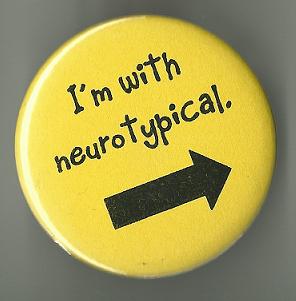You heard it. The term neurotypical. This is familiar among neurodiverse people (especially with autistics). But what exactly is the word neurotypical and what does this term imply to neurodiversity?
Neurotypical or NT, abbreviation for neurologically typical is is a neologism originating in the autistic community as a label for people who are not on the autism spectrum.[1][2] The term eventually became used for anyone who does not have atypical neurology. In other words, this refers to anyone who does not have conditions such as autism, dyslexia, developmental coordination disorder, or ADD/ADHD.
This term is also used by the scientific community.[1]
In short, neurotypical means the ‘usual’ human being with typical neurodevelopment. They are also called normal.
How do you know if someone (or you yourself) is neurotypical?
First of all, NTs comprise 99% of the world’s population. It means they’re everywhere. While neurodiverse people are only 1% of the population. Chances are, there is an NT in your family.[3]
You can tell if someone (or you yourself) is an NT by having (some or) all of these traits[3]:
First, an NT loves to have small talk or chit-chat. It means light talk or simple conversation that includes trivial topics like the weather, showbiz, gossip, etc. This ability is crucial to have rapport or to build ‘bonding’ with another person. For the neurodiverse, small talk is boring and considered nonsense.
Second, NTs love to ‘avoid honesty’.[4] This is how it works: when someone asks them about her appearance, the NT says she’s fine even if in fact she’s ugly. In fact, they love flattery even if it is really a lie. When feeling bad, they will tell you they’re okay when actually it’s not. For the neurodiverse, this is just confusing as you tell a thing when in fact you’re thinking of its opposite. In short, NTs love sarcasm.
Third, NTs are obsessed with social status. Typically, NTs want to beat their fellowmen when it comes to trends, may it be fashion, travel, luxuries, or sexual conquests, they want to be the ‘winner’. For the fellow NTs, these trends are like contests. Whenever they have more facebook fans or wear the latest fashion, they love to brag about it in public. However, if they see another NT who’s more ‘in’ than them, they will envy them.
Fourth, NTs are approval seekers. Though it seems like it’s insecurity in a sense, they love to have validation from others to keep them going. It’s not that all NTs are insecure, but most of them do want approval from peers.
Fifth, NTs have herd mentality. Wherever one NT is, the others follow. Let’s give an example: ‘trending activities’ on social media. From making duck faces to ice bucket challenge and even sexting, NTs just follow these trends even if some of these trends may seem stupid to the neurodiverse. Also, when one NT has a new app or gadget, every other NT follows her. And they too have to be similar to their fellow NTs in their behavior. For example, when it comes to peer pressure, NT teens usually have to conform just to be socially acceptable to the herd, not matter what the outcome is, whether they become sober, or they accidentally become pregnant or have an STD. But when they see a neurodiverse or fellow NT doing things that deviates from the ‘normal’ herd, they usually bully, make fun, or mock the neurodiverse. As for the NT, they have to follow the herd; otherwise, they will be left alone.

Join us and be cool! Leave us and you suck!
Sixth, NTs are solitude intolerant. How is that? While most neurodiverse people enjoy solo time to think or rest, most NTs get bored or become depressed when alone. They cannot live by just themselves only. They seek companionship wherever they go. That is why it’s common for them to find another date right away following a breakup from a relationship, though they haven’t really moved on from their exes. You can spot an NT from a neurodiverse by their history of past relstionships. An NT usually has 4 relationships and up plus a number of flings, fucking buddies, and other casual partners whereas a neurodivers has 2 or less relationships and a few to no flings or casual sex partners or may be a virgin. It’s not that all NTs are promiscuous, but most of them do.
And lastly, NTs are silence intolerant. They cannot stand to be silent for a long time; they need energy from people. NTs do want to spend most of their time with peers and be noisy whereas ASD folks enjoy being quiet and alone doing stuff.
Actually, there is a full ‘description’ of neurotypical syndrome, a parody made by the autistic comunity. You can follow this link here.
Disclaimer: This is only an opinion and these NT traits do not apply to all people. Some neurodiverse people like those with AD/HD do have these traits also. This article is for comparison of people with typical development against people with autism spectrum disorders.
Reference:
1. http://en.m.wikipedia.org/wiki/Neurotypical
2. Sinclair, Jim (1998). “A note about language and abbreviations”. Archived from the original on 2008-06-06. Retrieved January 31, 2015.
3. http://musingsofanaspie.com/2013/01/10/what-is-neurotypical/
4. http://uncyclopedia.wikia.com/wiki/Neurotypical_syndrome
Further reading:
1. http://isnt.autistics.org/
2. http://www.theneurotypical.com/
3. http://actingnt.blogspot.com/2014/08/neurotypical-syndrome-played-straight.html
4. https://www.reclaiming.com/content/node/221
Posted from WordPress for Android







You must be logged in to post a comment.